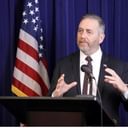
The Chairman of a state task force to reform Ohio’s death penalty and two former state Attorney Generals have joined a diverse coalition of public officials, death-row exonerees, family members of murder victims, former corrections officials, and religious leaders urging Ohio Governor John Kasich to halt the state’s planned resumption of executions. Citing legislative inaction on critical reforms, the high risk of error, and botched executions, the groups held a press conference (pictured) on July 29 detailing their opposition to Ohio’s planned execution of 27 prisoners between July 2017 and September 2020, and delivered to the governor petitions with over 27,000 signatures asking that executions not resume. Ohio has not carried out an execution since it botched the execution of Dennis McGuire in January 2014, but is scheduled to execute Ronald Phillips on July 25. In April 2014, a Joint Task Force to Review the Administration of Ohio’s Death Penalty created by the Ohio Supreme Court issued a detailed report highly critical of the state’s death penalty, and recommended 56 reforms to prevent wrongful convictions and unfair and arbitrary death sentences. In a written statement read at the press conference, the Task Force’s chairman, now retired Judge James Brogan, called Ohio’s planned resumption of executions “very troubling,” saying that “[t]hose charged with ensuring our capital punishment system is fair and accurate have failed to act.” Ohio “should not resume executions without addressing” the Task Force’s reforms, Brogan said. Former Ohio Attorney Generals, Democrat Jim Petro and Republican Lee Fisher also urged Governor Kasich to extend the current freeze on Ohio executions. In a July 20 guest column in the Cleveland Plain Dealer, they wrote, “we strongly believe that Ohio should not execute again until important safeguards are in place.” They said the 3½-year break since Ohio’s last execution “should have been used to improve the Ohio death penalty system. Instead, not a single substantive reform has been put in place to prevent wrongful convictions and improve fairness in Ohio’s capital punishment system.” Kwame Ajamu — one of the 9 Ohio death-row exonerees — also spoke at the press conference, stressing the risk of killing an innocent prisoner if executions resume. Family members of murder victims, corrections officials, and faith leaders, also spoke out against resuming executions and submitted letters to the Governor. “We are not asking the state to turn its back on people who commit serious crimes,” said Pastor Carl Ruby with the Central Christian Church. “We are in favor of hard-life sentences for people who commit despicable crimes, but the death penalty eliminates the possibility [of correcting mistakes if] we got it wrong.”
Phillips and other prisoners facing execution have challenged the lethal-injection formula that Ohio intends to use, saying that it will violate their right to be free from cruel and unusual punishment and that the state has reneged on its promise to never use two painful and agonizing drugs in executions. The prisoners won a stay of execution in Ohio federal district court, but a divided U.S. Court of Appeals reversed that decision. The prisoners have asked the Supreme Court to review their case and stay their executions.
(A. Johnson, Faith leaders, others urge Kasich to halt resumption of Ohio executions, Columbus Dispatch, July 19, 2017; J. Provance, Gov. John Kasich urged to block Ohio’s plan to resume executions, The Blade, July 19, 2017; R. Reitzel, Group asks Governor Kasich to stop scheduled executions, NBC4i.com, July 19, 2017; J. Petro and L. Fisher, “Gov. John Kasich should prevent Ohio executions from resuming,” Cleveland Plain Dealer, July 20, 2017.) Read the Press Release.



